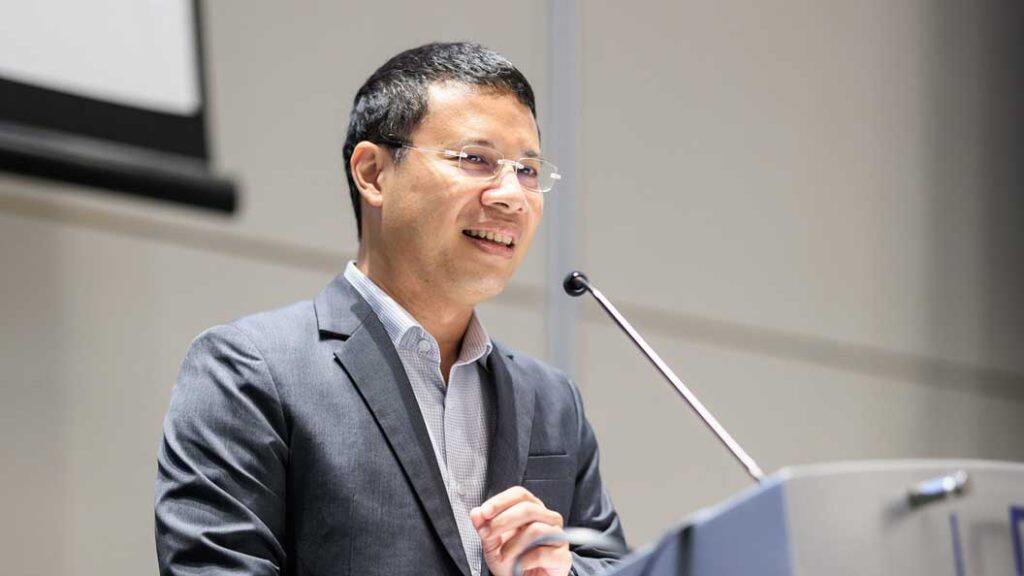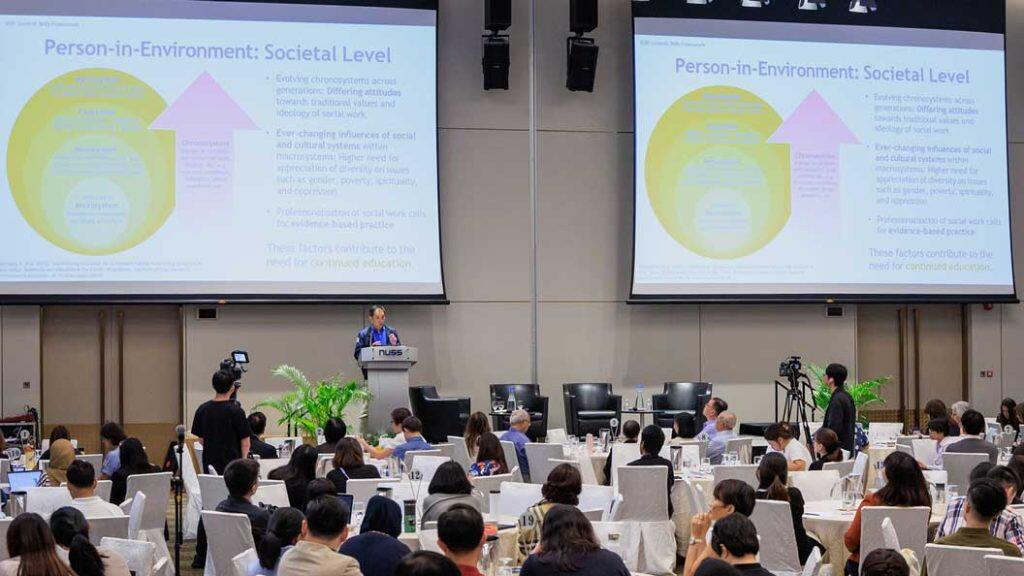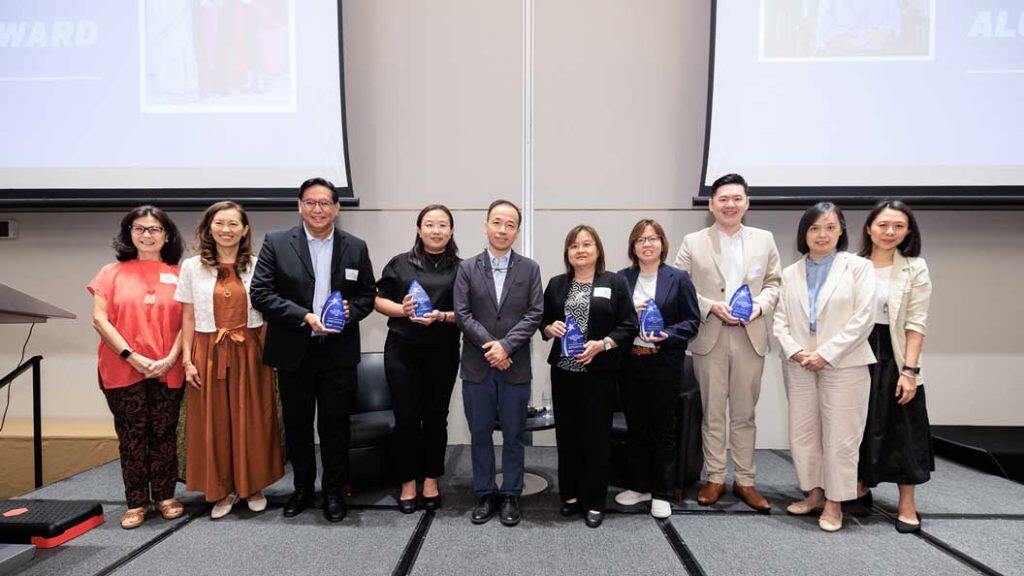

It can be challenging for some underprivileged families to receive the right support. But ComLink+, a government initiative that uplifts households with young children living in rental flats, is bridging the gap.
By harnessing data across government and the social service sector, ComLink+ gives social workers a clearer picture of these families’ needs, allowing them to help them more effectively.
The platform was cited by Minister for National Development and Minister-in-Charge of Social Services Integration Mr Desmond Lee as an example of how a tighter integration of support systems is necessary to address the growing complexity of social issues. But dealing with the future of social work will require more than this.
“Technology will also play an important part in shaping the profession through education and skills development,” said Mr Lee, who was speaking at a symposium in November titled “From Heritage to New Frontiers: Celebrating the Past and Reimagining the Future of Social Work”, organised by the NUS Department of Social Work.
Adopting such digitalisation is vital given the complex “multiverse” which consists of different realities for different people with different needs and preferences, added panellist Mr Martin Tan, Chief Executive Officer of non-profit group, The Majurity Trust.
Upskilling for social workers


To navigate this new multiverse, social workers should ensure they have the most up-to-date skills, said speakers and panellists at the symposium held at the NUSS Kent Ridge Guild House.
“While staying rooted to the core mission of social work, we should be ready to embrace change and continuously seek new knowledge and skills to remain relevant,” said Associate Professor Lee Geok Ling, Head of Department of Social Work.
“To achieve our shared goals, innovation, partnerships and a forward-looking, lifelong learning mindset are necessary,” she added.
To this end, the University is updating its social work courses to incorporate more digital technology. For instance, the Department of Social Work has introduced new courses for its undergraduate programme, such as “Social Work and Technology of the Future” and “Digital Technologies in Children and Youth Services”. The Department of Social Work’s Continuing Professional Education unit is also planning to launch four new tech-related courses focusing on AI, design thinking, data analysis, and working with ChatGPT.
Announcing these new courses at the symposium, NUS Deputy President (Academic Affairs) and Provost Professor Aaron Thean said, “These courses will empower social workers to harness technology for enhanced decision-making and efficiency, preparing future social workers and current practitioners with vital digital skills.”
The new courses build on existing NUS initiatives such as Blended Learning 2.0, which integrates traditional face-to-face teaching with technologies such as virtual reality simulations, allowing social work students to practise clinical skills in scenarios that mimic the real world.
“Social work is not just a profession, but also a calling that requires resilience, compassion, and innovation to navigate today’s rapidly changing world,” noted Prof Thean. “Social workers must evolve to remain effective and relevant amidst technological changes and uncertainties.”
It is a view shared by other symposium speakers such as Associate Professor Teo Poh Leng, Head of Social Work Undergraduate Programmes at the Singapore University of Social Sciences; and Dr Vincent Ng, Chief Executive Officer of social service agency Allkin Singapore Ltd.
They believe that social workers, similar to employees in other industries, “need to have a lifelong learning mindset”. “At an organisational level, we must provide opportunities for people to learn and grow. At the individual level, the responsibility for learning has to be personal,” added Dr Ng.
A crucial skill is design thinking, one of the focus areas of the new NUS courses, highlighted several speakers including Mr Benjamin Png, Product Manager and Policy & Transformation Specialist at Open Government Products, an experimental government team building technology for public good.
“In today’s world where things are a lot more complicated than before, it is worthwhile to start using design thinking to see how we can break problems down into smaller pieces and test out solutions, rather than commit wholeheartedly to one single solution that often doesn’t really work,” he explained.


Collaborate for more integrated support
Besides tapping technology, the social work industry also requires greater collaboration for greater impact, observed panellists and speakers.
“We try to work with the government to rethink policy, but there are market forces and businesses that play a part too. Then you have advocacy groups trying to campaign, and also intermediaries like us who are trying to connect the dots,” said Mr Tan from The Majurity Trust.
“But the key is this: the world is too complex today for any one of us to handle things on our own.” he stressed.
Minister Lee also called for much tighter integration of support around families with complex needs.
“We need to develop a stronger understanding of the broader social landscape and build extensive networks of partners with social workers at the core, so that we can achieve much closer collaboration between agencies and community organisations,” he said.
A way forward is to be more business-minded about social work, said Ms Wu Mei Ling, General Secretary and Chief Executive Officer of the YMCA of Singapore.
“Business models and tools can be and are being used for the delivery of social services,” she said, citing the World Business Council for Sustainable Development and the Dow Jones Sustainability Group as examples.
This, she added, can help to “build trust and collaboration” with other members in the sector through a “shared thinking and shared language”.
Singapore can also draw inspiration from other countries. “Let the world teach Singapore,” said Professor Irene Wong, S R Nathan Professor of Social Work at NUS, and Professor at the University of Pennsylvania.
She noted how a German case study on intimacy among people with intellectual disabilities had spurred “much animated and engaging discussion” among her students, giving them a fresh perspective on a topic that is not widely discussed in Singapore.
Social work is about people
Even as the social work profession prepares for a complex future shaped by technological changes, one thing remains unchanged: its human core.
“Technology cannot replace the personal touch and human instinct of our social work professionals,” said Minister Lee.
“We should embrace technology and AI with a critical and ethical mindset, and harness its power to amplify our impact while remaining true to the core values of social work and mindful of the sharp edges that technology can bring.”
NUS, for instance, is embracing this approach and has a rich legacy in this industry. Since 1952, its Department of Social Work has produced outstanding social workers who have made an impact in raising the bar and professionalising the industry.
To recognise NUS Social Work alumni who have made sustained and major contributions to social work education and practice, the Ann Wee NUS Social Work Alumni Award was set up in 2015 in honour of the late Mrs Ann Wee, NUS Department of Social Work’s longest serving Head from 1968 to 1986.
This year, the following alumni were recognised with the 2024 Ann Wee NUS Social Work Alumni Award.
- Corinne Ghoh, Associate Professor (Practice), Department of Social Work at NUS Faculty of Arts and Social Sciences
- Leow Sok Fen, Principal Medical Social Worker, Tan Tock Seng Hospital
- Tabitha Ong Yen Ping, Director, Adult Protective Service, Rehabilitation and Protection Group, Ministry of Social and Family Development
- Ian Peterson, Director (Family & Community Services), Care Corner Singapore Ltd
- Keith Tan, Master Medical Social Worker, Singapore General Hospital


These five individuals who hail from the three fields of medical social work, community-based social work, and policy work and academia were recognised for their significant contributions to healthcare systems (particularly during COVID-19), the evolving needs of families in the community, and their efforts to enhance the policy and practice of social work.






































